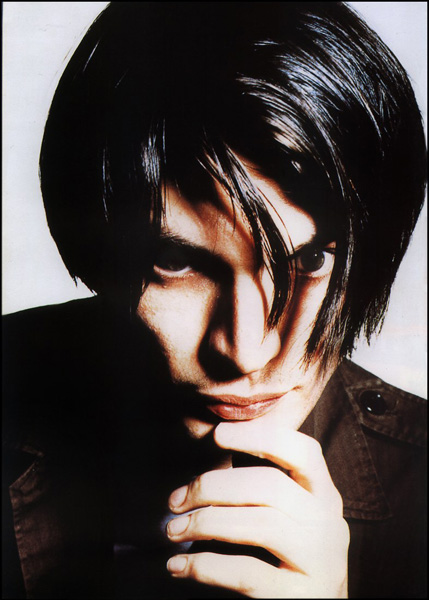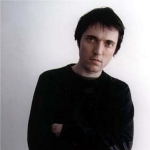Education
Greenwood had begun studying music and psychology at Oxford Brookes University when Radiohead predecessor On A Friday signed a recording contract with EMI in 1991. He left the university shortly after.

Johnny on the stage with Radiohead. The 2nd guitarist is Thom Yorke.
Poster of the album "Amnesiac" (2001)
Poster of the album "The Kings Of Limbs" (2011)
Poster of the album "OK Computer" (1997)
Poster of the album "Hail To The Thief" (2003)


Greenwood had begun studying music and psychology at Oxford Brookes University when Radiohead predecessor On A Friday signed a recording contract with EMI in 1991. He left the university shortly after.
Greenwood is the only member of Radiohead to have been classically trained on any instrument, and the only band member without a university degree; he was three weeks into a degree in music and psychology at Oxford Brookes University when Radiohead, then known as On a Friday, signed a recording contract with EMI in 1991, and left soon after. Greenwood stated that hearing Krzysztof Penderecki during that time had a significant influence on his perception of modern classical music.
Greenwood's influence on Radiohead's recording and writing can be heard in many songs, as he usually takes the traditional lead guitarist role. In the 1990s, Greenwood wore an arm brace due to a repetitive strain injury attributed to his aggressive playing, saying "it's like taping up your fingers before a boxing match."
Greenwood is often credited as the second major influence on songwriting in Radiohead, next to Thom Yorke. He wrote the music for the closing track of OK Computer, ("The Tourist"), and the intro, chorus and outro sections of the song "Subterranean Homesick Alien" from the OK Computer album, as well as the "rain down" section of "Paranoid Android". According to Yorke, the track "Just" from The Bends was "a competition by me and Jonny to get as many chords as possible into a song". An example of Greenwood's versatility is his use of the Ondes Martenot, which is featured on songs such as "The National Anthem" and "How to Disappear Completely" from the album Kid A, and "Pyramid Song" from the album Amnesiac. The song "Where I End and You Begin" from Hail to the Thief, which also features the instrument, was dedicated to the memory of Jeanne Loriod, a pioneer of the Ondes.
Greenwood and Yorke also collaborated on the song "Arpeggi" which is a piece in a classical style centred around arpeggios for voice, Ondes, and orchestra. It was performed with the London Sinfonietta and Arab Orchestra of Nazareth at the Ether Festival in March 2005; the song would later be adapted for the full band to play in 2006, rearranged for guitar. A studio version (closer to the full band version than the orchestral version) appeared on the album In Rainbows as "Weird Fishes/Arpeggi".
Greenwood is a computer programmer and builds software used in Radiohead's music. He became interested in programming when he was young, "playing around first with BASIC, then these primitive hex assemblers. Just simple bits of machine code – the closer I got to the bare bones of the computer, the more exciting I found it." At the suggestion of Radiohead producer Nigel Godrich, Greenwood began using the music programing language Max, and said: "I got to reconnect properly with computers ... I didn't have to use someone else's idea of what a delay, or a reverb, or a sequencer should do, or should sound like – I could start from the ground, and think in terms of sound and maths. It was like coming off the rails." Greenwood wrote the software Radiohead used to sample their playing for their eighth album, The King of Limbs (2011).
In 2003, Greenwood released his first solo album, Bodysong (2003), which is the soundtrack for the movie of the same title by filmmaker Simon Pummell. Bodysong also features contributions from his brother Colin on bass.
Jonny Greenwood was hired by the BBC as composer in residence to the BBC Concert Orchestra in May 2004, a job which gave him the opportunity to compose several pieces for symphony orchestra, piano and/or Ondes Martenot: smear, Piano for Children and Popcorn Superhet Receiver. smear premiered in 2004, and on 23 April 2005 Greenwood premiered his new work commissioned by BBC Radio 3, with music performed live by the BBC Concert Orchestra in London. The printed music for smear, Popcorn Superhet Receiver, Doghouse, Suite from Norwegian Wood and 48 Responses to Polymorphia (see below) is available from Faber Music Ltd in London. smear has also been recorded by the London Sinfonietta conducted by Martyn Brabbins and was Greenwood's recorded debut in the genre. Popcorn Superhet Receiver and 48 Responses to Polymorphia have also been released commercially.
Greenwood won the Radio 3 Listeners' Award at the 2006 BBC British Composer Awards for his piece, "Popcorn Superhet Receiver". The piece was inspired by radio static and the elaborate, dissonant tone clusters of Polish composer Krzysztof Penderecki's Threnody to the Victims of Hiroshima. It can be streamed from a BBC website. Upon winning the award Greenwood received £10,000 from the PRS Foundation towards a commission for a new orchestral work.
A fan of dub reggae, Greenwood released a compilation in collaboration with Trojan Records, entitled Jonny Greenwood Is the Controller in March 2007. This is the latest in Trojan's Artist Choice Jukebox series, to which DJ Spooky and Don Letts have already contributed. Trojan Records provided Greenwood with its extensive catalogue of songs, of which he chose 17. The title is a play on the first track on the collection, entitled "Dread Are the Controller", by Linval Thompson. The album contains tracks by artists such as Derrick Harriott, Gregory Isaacs, The Heptones and many more.
Greenwood composed the score for the 2007 film, There Will Be Blood, from director Paul Thomas Anderson. The soundtrack contains excerpts from "Popcorn Superhet Receiver". His work as the composer for this film was highly acclaimed by reviewers and earned him an award at the Critics' Choice Awards. On 21 January 2008, however, the score was declared ineligible for an Academy Award nomination under a rule that prohibited "scores diluted by the use of tracked themes or other pre-existing music." On 4 February 2008, it was announced that Greenwood had won the trophy for Best Film Score in the Evening Standard British Film Awards for 2007. In its 2009 end-of-decade round-up Rolling Stone magazine named the film the best of the decade and cited Greenwood's score as a major element in its success, "redefining what is possible in film scores".
In 2008, Greenwood wrote the theme music for Adam Buxton's comedy pilot meeBOX, and collaborated with Israeli rock musician Dudu Tasa on Tasa's Hebrew-language single "What a Day".
In February 2010, Greenwood debuted a composition entitled "Doghouse" at the BBC's Maida Vale Studios. In an interview following the performance, Greenwood and conductor Robert Ziegler revealed that the composition would be extrapolated into a score for the upcoming film Norwegian Wood directed by Anh Hung Tran, based on the best-selling novel of the same name by Haruki Murakami. Greenwood described the writing of the piece to the BBC, "I wrote this piece mostly in hotels and dressing rooms while touring with Radiohead. This was more practical than glamorous – lots of time sitting around indoors, lots of instruments about – and aside from picking up a few geographical working titles, I can't think that it had any effect where, on tour, it was written." The premiere of the entire score took place on 19 March 2010.
In 2011, Greenwood composed the score for the film adaptation of Lionel Shriver's novel We Need to Talk About Kevin. He composed the score for Paul Thomas Anderson's 2012 film The Master. This was the second collaboration between the two.
On 13 March 2012, Greenwood and Polish composer Krzysztof Penderecki released an album together on the Nonesuch label. It includes Greenwood's "Popcorn Superhet Receiver" and a new string orchestra work, "48 Responses to Polymorphia" (a homage to Penderecki's "Polymorphia" of 1961).
Greenwood has inspired many with his guitar playing and style. He is also known for his aggressive guitar playing style. Guitarists such as Russell Lissack of the English rock band Bloc Party and many others cite Greenwood as an influence. Greenwood was also ranked number 48 in Rolling Stone magazine's "100 Greatest Guitarists of All Time". When Rolling Stone Magazine updated their list in November 2011, Greenwood's rank had remained at 48.
Greenwood wrote the soundtracks for the films Bodysong (2003), There Will Be Blood (2007), Norwegian Wood (2010), We Need To Talk About Kevin (2011) and The Master (2012), and serves as composer-in-residence for the British Broadcasting Corporation Concert Orchestra.

In 1995 he married Israeli-born Sharona Katan, a visual artist whose work (credited as Shin Katan) appears on the covers of the Bodysong soundtrack as well as the There Will Be Blood soundtrack. Their first son, Tamir, was born in 2002 and the 2003 Radiohead album Hail to the Thief was dedicated to him. They also have a daughter named Omri, born in 2005, and a second son, named Zohar, who was born in February 2008.
